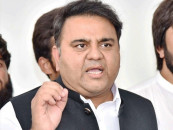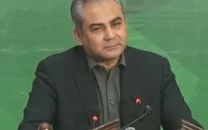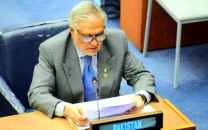Govt aims to reduce pension, wage bill
PM tasks committee to propose measure in a week

The PML-N government has set up a new committee to cut its size and also rationalise the expenditure on pensions and development -- in a move that covers hardly 16% of this year’s budget and may not result in any major savings.
Prime Minister Shehbaz Sharif has not included the defence budget and expenditure on interest payments in the purview of the committee -- the two largest heads that consume nearly two-thirds of the total federal budget.
The premier has constituted the seven-member committee, comprising four bureaucrats and three independent experts, including Dr Kaiser Bengali, who has long been advocating for cutting the non-combatant military budget and closing the cantonments.
He has given the committee one week to make recommendations to reduce the federal government expenditure.
The committee has the mandate to review the pension schemes -an issue that is also now figuring on the agenda of the International Monetary Fund (IMF). The global lender has listed the wage and pension bill of the government as an outstanding issue for discussions during its March 14-18 review talks.
The National Assembly has approved the Rs14.4 trillion budget for this fiscal year. Out of this total, the lion’s share—though still underscored—of Rs7.3 trillion was allocated for interest payments, with an additional Rs1.8 trillion earmarked for defence spending, excluding special programmes.
Deputy Chairman of the Planning Commission Dr Jehanzeb Khan, will serve as the chairman of the expenditure committee. The secretary of the cabinet division, the secretary of the finance division, and Rashid Mahmood Langrial, who serves as secretary of industry, are members representing the government side.
From the private sector, Dr Kaiser Bengali, a renowned economist, Dr Farrukh Saleem and Naveed Iftikhar are the members of the committee.
The committee has been mandated to take stock of all reports commissioned so far, including reports of the National Austerity Committee and the Institutional Reforms committed to reducing the size of the federal government.
Read more: Pakistan aims for large IMF loan
There are about one and a half dozen federal ministries that are functioning despite these subjects having been devolved to the provinces.
The committee has been asked to capture all the progress made so far in downsizing the federal government. The committee will prepare a strategy and implementation plan for all remaining recommendations with timelines, according to the notification.
The government has allocated Rs714 billion for running the civil government in the budget, a sum that is less than 5% of the total budget.
The committee has been tasked to make recommendations related to the Public Sector Development Programme and the pension schemes. For this fiscal year, the National Assembly allocated Rs900 billion for the development and Rs801 billion for the pensions.
Out of Rs801 billion, the cost of military pensions is Rs563 billion or 70% of the allocation for the pensions.
The exclusion of the defence budget and the interest payments from the scope of the committee has left little space for making any meaningful impact.
The finance ministry last month upwardly revised the budget deficit target to Rs8.5 trillion, primarily because of an increase in estimates of interest payments during this fiscal year.
Interest expenses have now been estimated at Rs8.333 trillion, compared to the annual allocation of Rs7.3 trillion.
Pakistan needs debt restructuring and sharp cuts in the interest rates by the central bank to make noticeable cuts in expenditure.
During the first seven months of this fiscal year, the government spent Rs4.66 trillion on interest payments, a sum that was more than the federal government’s net income during this period.
Past austerity policies have not helped achieve fiscal consolidation, often being relaxed after their approval. The former interim premier Anwaarul Haq Kakar had also approved new fiscal austerity measures, including a ban on creating new positions and major purchases.
The government has already placed a complete ban on creating new posts under the Public Sector Development Programme (PSDP) and the current budget for the fiscal year 2023-24.
There has already been a ban on the purchase of all vehicles except for ambulances, buses for educational institutions, solid waste vehicles, tractors, fire-fighting vehicles, and motorbikes, according to the decision.



















COMMENTS
Comments are moderated and generally will be posted if they are on-topic and not abusive.
For more information, please see our Comments FAQ